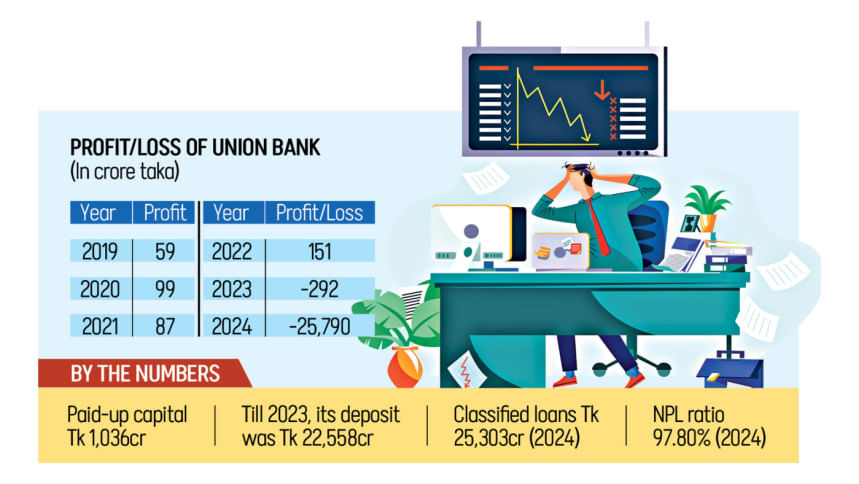Tk 25,790cr: Union Bank posts biggest loss in banking history

Union Bank, one of the troubled shariah-based banks being merged, has reported a record loss of Tk 25,790 crore for 2024, the highest annual loss ever recorded by any bank in Bangladesh.The bank's disclosure on the Dhaka Stock Exchange website yesterday showed an earnings per share (EPS) of Tk -248.9, compared to -2.82 in 2023, when it posted losses of Tk 292 crore.No other bank in the country has come close to this scale of financial damage. The second-highest loss in the sector was logged by J...
Union Bank, one of the troubled shariah-based banks being merged, has reported a record loss of Tk 25,790 crore for 2024, the highest annual loss ever recorded by any bank in Bangladesh.
The bank's disclosure on the Dhaka Stock Exchange website yesterday showed an earnings per share (EPS) of Tk -248.9, compared to -2.82 in 2023, when it posted losses of Tk 292 crore.
No other bank in the country has come close to this scale of financial damage. The second-highest loss in the sector was logged by Janata Bank at Tk 3,066 crore last year, while AB Bank, National Bank, and Global Islami Bank each reported losses exceeding Tk 1,000 crore.
The scale of distress in the banking sector became apparent after the fall of the Sheikh Hasina-led government in August 2024. Following the political changeover, investigations revealed massive loan irregularities in banks linked to the S Alam Group owned by Saiful Alam.
Union Bank alone accounted for Tk 25,303 crore of the country's Tk 420,335 crore in bad loans as of March 2024, with most of its distressed assets concentrated in Chattogram.
With a paid-up capital of Tk 1,036 crore, nearly half of which came from general investors, the bank's financial structure has now collapsed beyond repair. Until 2023, its deposit base stood at Tk 22,558 crore, much of which is now under threat.
The impact on ordinary depositors has been severe. Iqbal Hossain, a small shopkeeper in Chattogram, saved Tk 2,000 a month in a deposit scheme for four years, hoping to use the funds to expand his cow farming business.
When the scheme matured in June, he was unable to withdraw his money in full. "They allowed me to take out Tk 1,000 per day, and even that stopped after 13 days," he said.
He now waits for clarity under a government-ordered merger process, which is expected to allow depositors to withdraw up to Tk 2 lakh.
Union Bank came under the control of S Alam Group in 2013. In 2020, Saiful Alam's son, Ahsanul Alam, became the bank's chairman, making him the youngest to hold such a position in the sector. Before that, he served as vice-chairman and headed the bank's executive committee.
After the change in government, Bangladesh Bank ordered forensic audits, supported by the Asian Development Bank, into several banks suspected of deep irregularities. Review by the reputed British accounting firm KPMG uncovered extreme mismanagement at Union Bank, including an NPL ratio of 97.8 percent as of September 2024.
Later, invoking the Bank Resolution Ordinance 2025, the central bank moved to merge Union Bank with four other distressed lenders. An administrator has been appointed to oversee the process.
The banking regulator said shareholders of the banks selected for merger will receive no compensation. Trading in the banks' shares has been suspended on the DSE. Before the suspension, shares of Union Bank last traded at Tk 1.5.